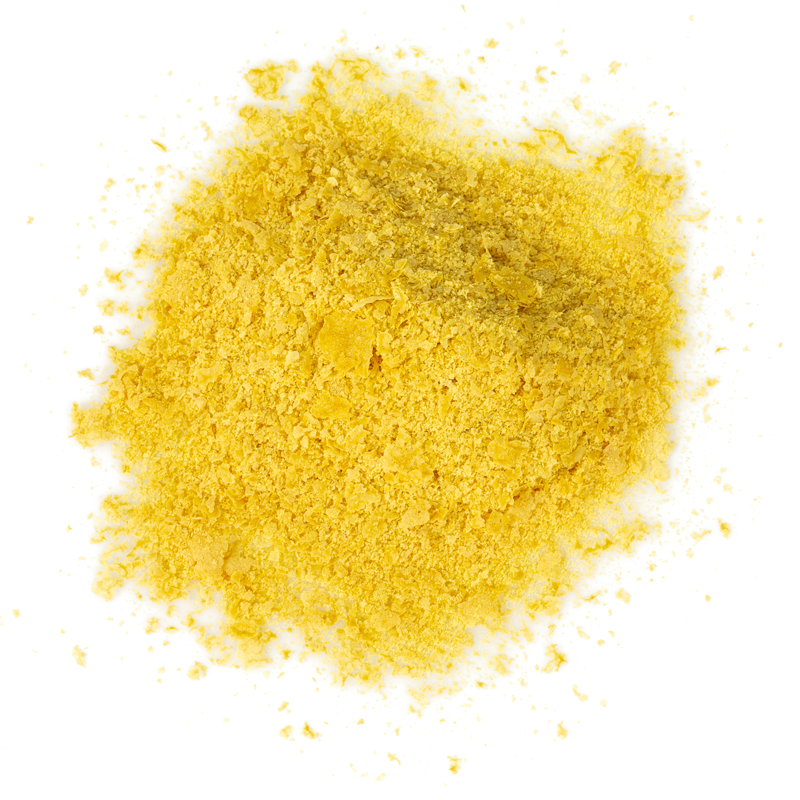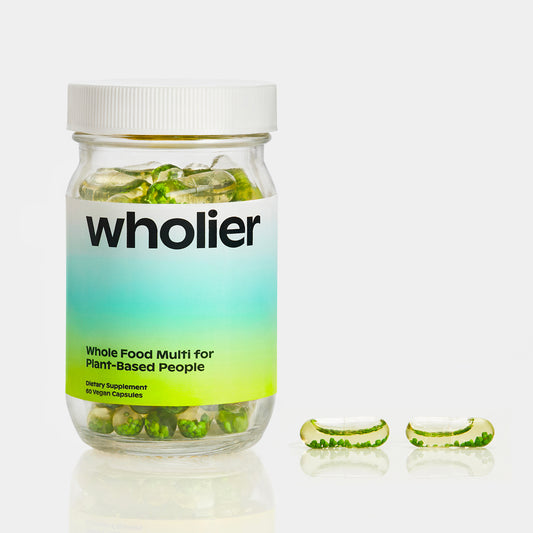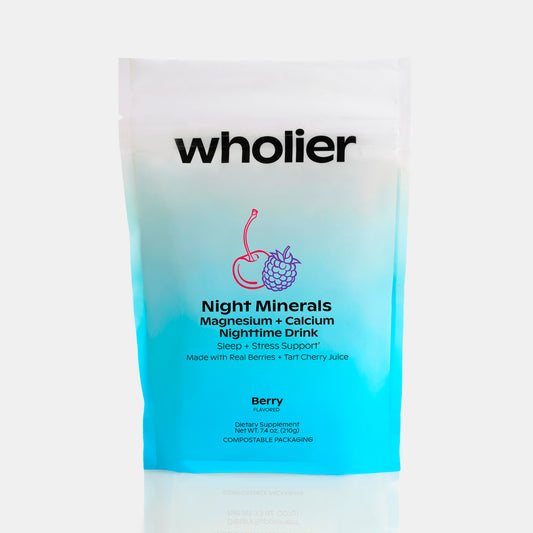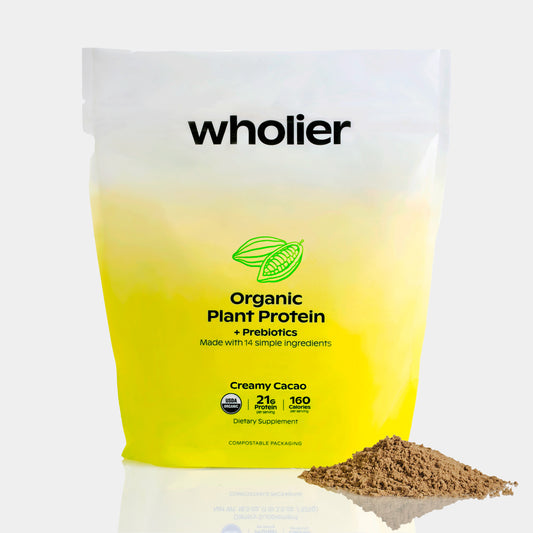
Nutritional Yeast: The Cheesy Vegan Superfood and Its Health Benefits
Are you looking for a tasty, nutritious addition to your vegan meals? Look no further than nutritional yeast! This savory, cheesy-flavored ingredient not only adds a burst of flavor but also packs a punch when it comes to essential nutrients. In this article, we'll dive into what nutritional yeast is, the incredible nutrients it provides, and how to use it in your everyday cooking. Plus, we'll introduce you to a unique nutritional yeast product by wholier that's enriched with prebiotics, probiotics, and vitamin B12 as methylcobalamin.
What is Nutritional Yeast?
What exactly is this magical ingredient? Nutritional yeast is an inactive form of yeast, specifically Saccharomyces cerevisiae, that is grown on a sugar-rich medium like molasses(1). Once harvested, the yeast is washed, dried, and crumbled into yellow flakes, granules, or powder(2). The result is a versatile, savory ingredient with a cheese-like flavor that vegans and non-vegans alike can enjoy.
What Nutrients Can Be Found in Nutritional Yeast?
Why is nutritional yeast considered a vegan superfood? It's all about the nutrients! Nutritional yeast is a rich source of essential vitamins and minerals, including B-complex vitamins, protein, and trace minerals like zinc and selenium(3).
The B-complex vitamins found in nutritional yeast play a crucial role in energy production, brain function, and overall health(4). B vitamins like thiamine, riboflavin, niacin, and pyridoxine are abundant in nutritional yeast, but the real star is vitamin B12. As a vegan, you might be aware of the challenges in getting enough B12 from plant-based sources. Nutritional yeast is an excellent way to ensure you're meeting your daily B12 needs(5).
Additionally, nutritional yeast is a complete protein, containing all nine essential amino acids. This makes it an excellent source of plant-based protein for vegans and vegetarians(6).
What Sets wholier's Nutritional Yeast Apart?
So, what makes wholier's nutritional yeast, aka Nooch, stand out from the crowd? It's the only nutritional yeast on the market that contains prebiotics, probiotics, and vitamin B12 as methylcobalamin instead of cyanocobalamin.
Why does this matter? Methylcobalamin is a naturally occurring form of vitamin B12 that is better absorbed and utilized by the body compared to cyanocobalamin, the synthetic form often found in supplements(7).
Moreover, wholier's nutritional yeast boasts the addition of prebiotics and probiotics. These work together to promote a healthy gut microbiome, which in turn supports digestion, immunity, and overall well-being(8).
With wholier's Nooch Nutritional Yeast, you're not only getting a delicious and nutritious vegan staple but also a gut-boosting powerhouse.
How Can You Use Nutritional Yeast in Your Meals?
Looking for creative ways to incorporate nutritional yeast into your diet? Here are some ideas to get you started:
- Sprinkle it on popcorn for a cheesy, nutritious snack.
- Stir it into pasta sauces or soups for added depth of flavor.
- Use it to make vegan cheese sauces for mac and cheese, nachos, or fondue.
- Mix it into salad dressings or dips for a tangy, cheesy twist.
- Sprinkle it on roasted vegetables or baked potatoes for extra flavor.
- Use it as a topping for avocado toast, pizza, or baked tofu.
- Combine it with breadcrumbs and seasonings for a delicious coating for tofu or tempeh.
- Fold it into scrambled tofu or chickpea flour omelets for a cheesy breakfast delight
- Create a savory, cheesy spread by mixing it with vegan cream cheese or mashed avocado.
Nutritional yeast is a versatile, delicious, and nutrient-packed ingredient that should be a staple in every vegan pantry. With its cheesy flavor and impressive nutrient profile, it's no wonder that it's a favorite among plant-based eaters.
wholier's Nooch Nutritional Yeast takes it a step further by incorporating prebiotics, probiotics, and a superior form of vitamin B12. By choosing this unique product, you'll not only enjoy the savory taste and nutritional benefits of traditional nutritional yeast but also support your gut health and overall well-being(1).
Ready to give nutritional yeast a try? Your taste buds and your body will thank you!
Sources:
(1) Turck, D., Bresson, J. L., Burlingame, B., Dean, T., Fairweather-Tait, S., Heinonen, M., Hirsch-Ernst, K. I., Mangelsdorf, I., McArdle, H. J., Naska, A., Neuhäuser-Berthold, M., Nowicka, G., Pentieva, K., Sanz, Y., Siani, A., Sjödin, A., Stern, M., Tomé, D., ... Sjödin, A. (2018). Safety of Yarrowia lipolytica yeast biomass as a novel food pursuant to Regulation (EC) No 258/97. EFSA Journal, 16(1), e05100. https://doi.org/10.2903/j.efsa.2018.5100
(2) Slavin, J. L., & Lloyd, B. (2012). Health benefits of fruits and vegetables. Advances in Nutrition, 3(4), 506–516. https://doi.org/10.3945/an.112.002154
(3) Rizzo, G., Laganà, A. S., Rapisarda, A. M. C., La Ferrera, G. M. G., Buscema, M., Rossetti, P., Nigro, A., Muscia, V., Valenti, G., Sapia, F., Sarpietro, G., Zigarelli, M., & Vitale, S. G. (2016). Vitamin B12 among vegetarians: Status, assessment and supplementation. Nutrients, 8(12), 767. https://doi.org/10.3390/nu8120767
(4) Kennedy, D. O. (2016). B vitamins and the brain: Mechanisms, dose and efficacy—A review. Nutrients, 8(2), 68. https://doi.org/10.3390/nu8020068
(5) Pawlak, R., Parrott, S. J., Raj, S., Cullum-Dugan, D., & Lucus, D. (2013). How prevalent is vitamin B12 deficiency among vegetarians? Nutrition Reviews, 71(2), 110–117. https://doi.org/10.1111/nure.12001
(6) van Vliet, S., Burd, N. A., & van Loon, L. J. (2015). The skeletal muscle anabolic response to plant- versus animal-based protein consumption. The Journal of Nutrition, 145(9), 1981–1991. https://doi.org/10.3945/jn.114.204305
(7) Plesoianu, D. F., & Grigore-Gurgu, L. (2019). The importance of vitamin B12 in the human body. In Proceedings of the 1st Conference on Innovations in Bio-Inspired Computing and Applications (pp. 83–88). https://doi.org/10.1109/IBICA.2019.8907271
(8) Hutkins, R. W., Krumbeck, J. A., Bindels, L. B., Cani, P. D., Fahey, G., Goh, Y. J., Hamaker, B., Martens, E. C., Mills, D. A., Rastal, R. A., Vaughan, E., & Sanders, M. E. (2016). Prebiotics: Why definitions matter. Current Opinion in Biotechnology, 37, 1–7. https://doi.org/10.1016/j.copbio.2015.09.001






